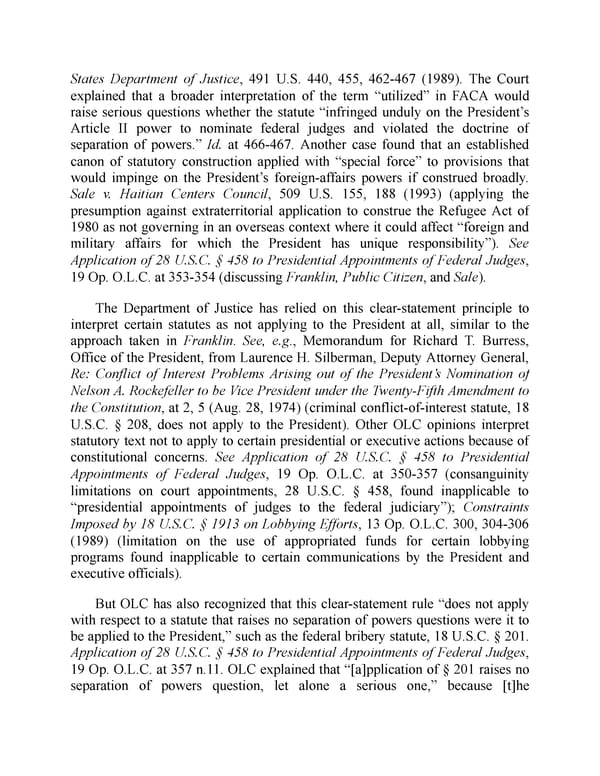States Department of Justice, 491 U.S. 440, 455, 462-467 (1989). The Court explained that a broader interpretation of the term “utilized” in FACA would raise serious questions whether the statute “infringed unduly on the President’s Article II power to nominate federal judges and violated the doctrine of separation of powers.” Id. at 466-467. Another case found that an established canon of statutory construction applied with “special force” to provisions that would impinge on the President’s foreign-affairs powers if construed broadly. Sale v. Haitian Centers Council, 509 U.S. 155, 188 (1993) (applying the presumption against extraterritorial application to construe the Refugee Act of 1980 as not governing in an overseas context where it could affect “foreign and military affairs for which the President has unique responsibility”). See Application of 28 U.S.C. § 458 to Presidential Appointments of Federal Judges, 19 Op. O.L.C. at 353-354 (discussing Franklin, Public Citizen, and Sale). The Department of Justice has relied on this clear-statement principle to interpret certain statutes as not applying to the President at all, similar to the approach taken in Franklin. See, e.g., Memorandum for Richard T. Burress, Office of the President, from Laurence H. Silberman, Deputy Attorney General, Re: Conflict of Interest Problems Arising out of the President’s Nomination of Nelson A. Rockefeller to be Vice President under the Twenty-Fifth Amendment to the Constitution, at 2, 5 (Aug. 28, 1974) (criminal conflict-of-interest statute, 18 U.S.C. § 208, does not apply to the President). Other OLC opinions interpret statutory text not to apply to certain presidential or executive actions because of constitutional concerns. See Application of 28 U.S.C. § 458 to Presidential Appointments of Federal Judges, 19 Op. O.L.C. at 350-357 (consanguinity limitations on court appointments, 28 U.S.C. § 458, found inapplicable to “presidential appointments of judges to the federal judiciary”); Constraints Imposed by 18 U.S.C. § 1913 on Lobbying Efforts, 13 Op. O.L.C. 300, 304-306 (1989) (limitation on the use of appropriated funds for certain lobbying programs found inapplicable to certain communications by the President and executive officials). But OLC has also recognized that this clear-statement rule “does not apply with respect to a statute that raises no separation of powers questions were it to be applied to the President,” such as the federal bribery statute, 18 U.S.C. § 201. Application of 28 U.S.C. § 458 to Presidential Appointments of Federal Judges, 19 Op. O.L.C. at 357 n.11. OLC explained that “[a]pplication of § 201 raises no separation of powers question, let alone a serious one,” because [t]he
 Mueller Report PDF Page 499 Page 501
Mueller Report PDF Page 499 Page 501